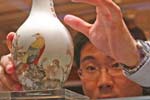Top News
1st trade deficit for China since '04
Updated: 2011-04-11 10:58
By Ding Qingfen and Zhong Nan (China Daily)
BEIJING - China reported its first quarterly trade deficit in seven years, although bilateral trade with the United States registered a surplus.
China had a first-quarter deficit of $1.02 billion, compared with a surplus of $13.9 billion last year, the General Administration of Customs said on Sunday.
This is the first deficit since 2004 when an $8 billion deficit was reported in the first quarter of that year.
However, China had a $34.55 billion surplus with the US, with bilateral trade increasing by 25 percent to $97.65 billion.
Exports to the US grew by 21.4 percent from a year earlier to $66.1 billion, while imports surged 33.3 percent to $31.55 billion.
Analysts said the growth showed that Sino-US trade has gathered pace after seasonal factors faded.
"The trade is back on track," said Xiao Lian, director of the Center for US Economic Studies at the Chinese Academy of Social Sciences.
"Chinese exports to the US shrank in February due to the Spring Festival holiday, but they came back in March."
Businesses usually slow down during the Chinese New Year period, which was in February this year.
China will send more trade delegations to the US and Europe to buy more goods, a practice China often uses to narrow trade imbalance with major trading partners
But Li Jinlin, dean of School of Management and Economics of Beijing University of Technology, said sending trade delegations cannot resolve the problem.
Xiao said the US should lift its ban on exports of high-tech and military goods to China.
"The US isn't treating China equally. It bans from selling any military products and restricts on exporting civil goods with military functions to China," he said.
"But it earns a lot by selling these products to Europe, Japan and Saudi Arabia."
China's first quarter deficit was chiefly attributed to efforts to promote imports and the soaring prices of key imported commodities, said Zhang Yansheng, director of the Institute for International Economics Research under the National Development and Reform Commission.
"Reduced export growth, due to the rising costs of labor, land and oil, along with yuan appreciation and rising interest rates also contributed (to the deficit)," he said.
Dong Xian'an, chief economist at Peking First Advisory, said there are three reasons behind the deficit.
"Chinese manufacturers hoarding commodities in anticipation of inflation, the Japanese earthquake and political turmoil in some Arab nations helped push up prices," he said.
Zhang also cited China's increasing overseas purchases, including high-tech equipment, aircraft, raw materials, soybean and corn toward the end of 2010 as another reason.
But economists believed the deficit would not last, amid efforts to control capital flow and combat inflation.
"The tightening policies will hold back import growth," said senior economist Stephen Green at Standard Chartered Shanghai.
China Daily
Specials

Share your China stories!
Foreign readers are invited to share your China stories.

Art auctions
China accounted for 33% of global fine art sales.

Waiting for drivers' seat
Lack of sponsorship appears to be why Chinese drivers have yet to race in a Formula 1 event